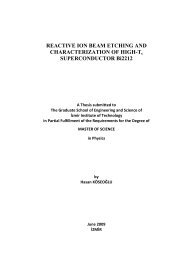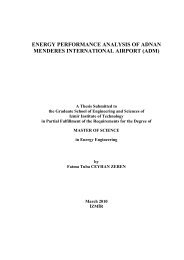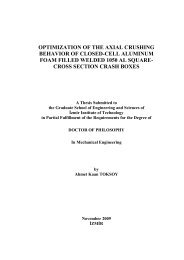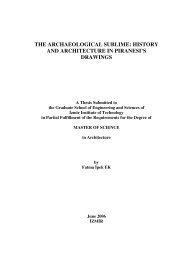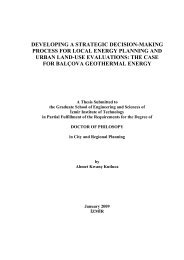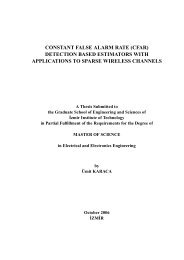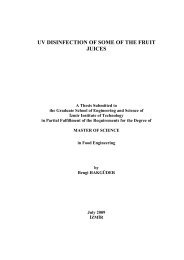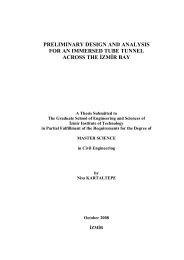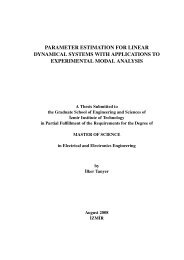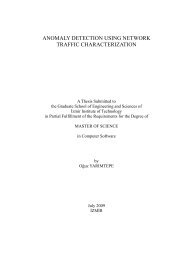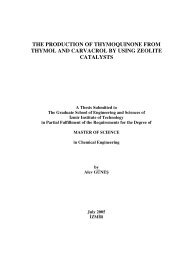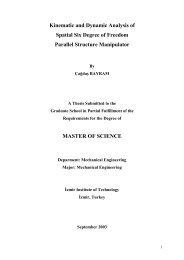a critical evaluation on the concept of justice in planning process
a critical evaluation on the concept of justice in planning process
a critical evaluation on the concept of justice in planning process
Create successful ePaper yourself
Turn your PDF publications into a flip-book with our unique Google optimized e-Paper software.
also <strong>the</strong> legal and legitimacy <strong>process</strong>es need to regard this approach and make<br />
<str<strong>on</strong>g>evaluati<strong>on</strong></str<strong>on</strong>g>s <strong>of</strong> decisi<strong>on</strong>s and activities about space.<br />
When <strong>the</strong> c<strong>on</strong>siderati<strong>on</strong> <strong>of</strong> <strong>justice</strong> c<strong>on</strong>cept is evaluated from <strong>the</strong> viewpo<strong>in</strong>ts <strong>of</strong><br />
pla<strong>in</strong>tiffs, defendants, expert committee and courts <strong>in</strong> <strong>the</strong>se studied acts, it is seen that<br />
<strong>the</strong>re is no comm<strong>on</strong> def<strong>in</strong>iti<strong>on</strong> and/or c<strong>on</strong>siderati<strong>on</strong> both with<strong>in</strong> <strong>the</strong> parties and am<strong>on</strong>g<br />
<strong>the</strong> parties. These parties which put demands, <str<strong>on</strong>g>evaluati<strong>on</strong></str<strong>on</strong>g>s and <strong>in</strong>terventi<strong>on</strong>s <strong>on</strong> urban<br />
space, expla<strong>in</strong> <strong>the</strong> freedoms, rights, <strong>in</strong>terests and equalities which are comp<strong>on</strong>ents <strong>of</strong><br />
<strong>justice</strong> c<strong>on</strong>cept with <strong>the</strong> below menti<strong>on</strong>ed differences.<br />
In different acts, it is found that <strong>the</strong>re existed no homogenous structure am<strong>on</strong>g<br />
<strong>the</strong> pla<strong>in</strong>tiffs <strong>of</strong> <strong>the</strong> acts that were charged with a demand <strong>of</strong> reach<strong>in</strong>g to just results<br />
through just <strong>process</strong>es. Part <strong>of</strong> <strong>the</strong> settlers who built illegal build<strong>in</strong>gs and who objected<br />
to <strong>the</strong> demolishment decisi<strong>on</strong> demands <strong>the</strong> abolishment <strong>of</strong> <strong>the</strong> restricted development<br />
rights. These demands mostly come from people who have mid and high <strong>in</strong>comes and<br />
who want to build a house <strong>on</strong> <strong>the</strong>ir own land. Am<strong>on</strong>g <strong>the</strong>se acts <strong>the</strong>re is <strong>on</strong>ly <strong>on</strong>e act <strong>on</strong><br />
gecek<strong>on</strong>du areas and he menti<strong>on</strong>s that he built “an illegal floor” <strong>in</strong> order to meet his<br />
“shelter<strong>in</strong>g need”. Even though <strong>the</strong> demands <strong>of</strong> two groups <strong>of</strong> pla<strong>in</strong>tiffs about <strong>the</strong><br />
abolishment <strong>of</strong> hous<strong>in</strong>g rights and limitati<strong>on</strong>s seem to have similar c<strong>on</strong>tents it is clear<br />
that <strong>the</strong>y do not have similar socio-ec<strong>on</strong>omic c<strong>on</strong>diti<strong>on</strong>s. While <strong>the</strong>se two parties<br />
<strong>in</strong>dicate to <strong>the</strong> usage <strong>of</strong> <strong>in</strong>dividualistic ownership rights <strong>in</strong> <strong>the</strong>ir claims defendant<br />
municipalities as local adm<strong>in</strong>istrative units claim that <strong>the</strong>y act “equally” to <strong>the</strong>se two<br />
groups and that <strong>the</strong>se types <strong>of</strong> applicati<strong>on</strong>s are predicted by laws, also, “for public<br />
<strong>in</strong>terest”. Op<strong>in</strong>i<strong>on</strong>s <strong>of</strong> expert committee c<strong>on</strong>trol <strong>the</strong> appropriati<strong>on</strong> <strong>of</strong> build<strong>in</strong>g sites to <strong>the</strong><br />
exist<strong>in</strong>g plans and laws as a technical and procedural <strong>process</strong> and “<strong>the</strong>ir appropriati<strong>on</strong> to<br />
<strong>justice</strong>” bases <strong>on</strong> <strong>the</strong>se <str<strong>on</strong>g>evaluati<strong>on</strong></str<strong>on</strong>g>s. At this po<strong>in</strong>t both <strong>in</strong> <strong>the</strong> <str<strong>on</strong>g>evaluati<strong>on</strong></str<strong>on</strong>g>s <strong>of</strong> defendants<br />
and <strong>of</strong> <strong>the</strong> expert committees, <strong>justice</strong> is c<strong>on</strong>sidered as “be<strong>in</strong>g appropriate with <strong>the</strong><br />
regulati<strong>on</strong>s” and be<strong>in</strong>g appropriate with <strong>the</strong> exist<strong>in</strong>g arrangements. However, <strong>in</strong> such a<br />
c<strong>on</strong>siderati<strong>on</strong>, because “<strong>justice</strong>” c<strong>on</strong>cept <strong>in</strong>volved by <strong>the</strong> exist<strong>in</strong>g regulati<strong>on</strong>s is taken<br />
out <strong>of</strong> <str<strong>on</strong>g>evaluati<strong>on</strong></str<strong>on</strong>g> <strong>process</strong> it is <strong>on</strong>ly possible to talk about its appropriateness to <strong>the</strong><br />
regulati<strong>on</strong>s ra<strong>the</strong>r than its be<strong>in</strong>g just. Dur<strong>in</strong>g <strong>the</strong> adjudicati<strong>on</strong> <strong>process</strong> determ<strong>in</strong>ed by <strong>the</strong><br />
court council, different courts reach different results and mostly give decisi<strong>on</strong>s <strong>in</strong><br />
parallel with <strong>the</strong> <str<strong>on</strong>g>evaluati<strong>on</strong></str<strong>on</strong>g>s <strong>of</strong> <strong>the</strong> expert committees. In o<strong>the</strong>r words, <strong>the</strong> levels <strong>of</strong> legal<br />
appropriateness <strong>of</strong> <strong>the</strong> technical / procedural <strong>process</strong>es are c<strong>on</strong>trolled by <strong>the</strong> courts.<br />
However, <strong>the</strong> mean<strong>in</strong>g <strong>of</strong> results be<strong>in</strong>g just from <strong>the</strong> viewpo<strong>in</strong>t <strong>of</strong> <strong>the</strong> courts, means<br />
191



